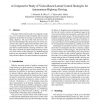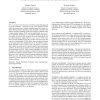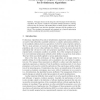113
click to vote
ICRA
2010
IEEE
15 years 19 days ago
2010
IEEE
Abstract— We present successful control strategies for dynamically stable robots that avoid low ceilings and other vertical obstacles in a manner similar to limbo dances. Given t...
140
click to vote
ENTCS
2008
15 years 2 months ago
2008
We present Oracle-Based Partial Evaluation (OBPE), a novel approach to on-line Partial Evaluation (PE) which decides the control strategy to use for each call pattern by using an ...
111
click to vote
ECAI
1994
Springer
15 years 6 months ago
1994
Springer
This paper introduces a simple yete ective method for using causal domain knowledge for learning to control dynamic systems. Elementary qualitative causal dependencies of the domai...
ICRA
1998
IEEE
15 years 6 months ago
1998
IEEE
Bipedal robots are di cult to analyze mathematically. However, successful control strategies can be discovered using simple physical intuition and can be described in simple terms...
ICRA
1998
IEEE
15 years 6 months ago
1998
IEEE
ct This paper willpresent the resultsof a comparative study of a set of vision-based control strategies that have been applied to the problem of steering an autonomous vehicle alon...
106
click to vote
CONTEXT
2005
Springer
15 years 7 months ago
2005
Springer
This article concerns red-light running at intersections and deals with the impact of different types of control strategies. Red running occurrences at red onset are observed throu...
118
click to vote
SENSYS
2005
ACM
15 years 7 months ago
2005
ACM
Increasing user comfort and reducing operation costs have always been two primary objectives of building operations and control strategies. Current building control strategies are...
112
click to vote
ICRA
2005
IEEE
15 years 7 months ago
2005
IEEE
Abstract— We aim at developing autonomous microflyers capable of navigating within houses or small built environments. The severe weight and energy constraints of indoor flying...
105
click to vote
PEPM
2007
ACM
15 years 8 months ago
2007
ACM
Poly-Controlled Partial Evaluation (PCPE) is a powerful approach to partial evaluation, which has recently been proposed. PCPE takes into account sets of control strategies instea...
AE
2007
Springer
15 years 8 months ago
2007
Springer
This paper focuses on the design of control strategies for Evolutionary Algorithms. We propose a method to encapsulate multiple parameters, reducing control to only one criterion. ...



